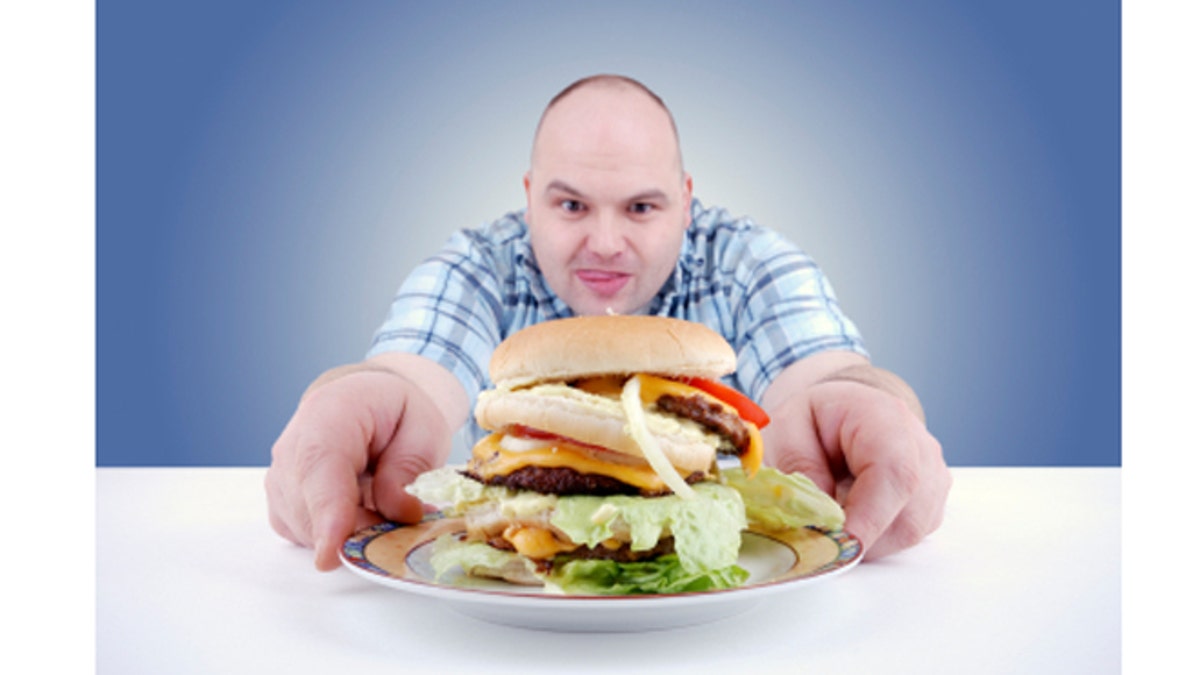
(iStock)
"I bypassed the three-cheese lasagna, those gargantuan slabs of turtle cheesecake didn't tempt me one bit, and I stuck with two glasses of pinot noir that I subsequently and sensibly swapped for a few glasses of iced tea," my friend recently recounted about an unseasonably cool March picnic where she ate perfectly.
That is, until a gourmet salad arrived on the table. "I engulfed four plates!" she confessed, mortified she couldn't control herself with such a healthy food.
More: 7 'Healthy' Foods Making You Gain Weight
Overeating happens to the best of us, and we rarely do it out of genuine hunger. Seldom does it occur with salad either: More likely, we're prone to gorge on a pepperoni deep dish.
We ruled out the usual suspects that contribute to out-of-control eating. My friend wasn't choosing high-sugar impact foods that make overeating easy, she practiced mindfulness while eating, she felt certain no food intolerances had slipped in, and she never skipped meals.
So how could a seemingly innocuous salad become her undoing?
A little sleuthing revealed her problem. If you're doing everything correctly and still overeating, these three often-looked suspects might be your culprits.
1. You're Eating this Seconds-Triggering Combo
Nobody sits down to eat a bowl of sugar or salt, but mix them together with butter and you've got frosting: The perfect storm for gorging.
In his book “The End of Overeating,” Dr. David Kessler talks about how the sugar/salt/fat combination in even so-called healthy foods creates an addiction that makes it virtually impossible to eat these foods in moderation: "Until you have gained the upper hand over trigger foods, an attempt at moderation won't work."
In other words, if you have a little bit, you will want a little bit more and more.
For my friend, that sweet-salty-fatty creamy vinaigrette dressing coupled with high-sugar impact ingredients like dried cranberries and candied walnuts made her want more… and more… Couple that with salad's health-halo façade and you can begin to understand her can't-stop-eating-it dilemma.
2. You're Using Artificial Sweeteners
How can zero-calorie sweeteners wreck havoc on your waistline? Well, my friend swapped pinot noir for iced tea. That might sound like a wise idea until you consider that tea contained sucralose, an artificial sweetener that could create calorie dysregulation. This means your body loses it ability to correlate the degree of a food's sweetness to the amount of calories it contains.
When you eat or drink something super-sweet (yes, even iced tea), your body should say, "Wow! I just had a lot of calories!" Then you're satisfied after a small amount.
Unfortunately, artificial sweeteners teach your body not to respond this way. Studies show dietary factors that degrade the relationship between sweet tastes, food viscosity, and calories might contribute to overeating and weight gain.
Eating sweet substances without calories sets you up to fail because your body misses all the cues it's looking for to stop eating. When that relationship between taste and calories falls apart, it may contribute to overeating and weight gain.
My friend's sucralose-sweetened tea triggered a sweet craving that made her eat more and more of sugary salad, even after her brain said STOP! I also witnessed this pattern repeatedly among clients who drank numerous diet sodas and then uncontrollably gorged on popcorn and other so-called healthy snacks that created havoc on their waistlines.
More: 7 Diet Hacks for Fabulous Skin
3. Insufficient Sleep
My friend was going through a particularly nasty breakup, and drowning herself in work to assuage grief often meant burning the midnight oil. She didn't make that connection, but I did: Crappy sleep makes you overeat.
Numerous studies show this loud and clear. One study found reduced sleep might lead to greater propensity to overeat. Another study showed insufficient sleep could contribute to overweight and obesity. Yet another study found bad sleep exacerbates insulin resistance, predisposing you to overeat.
How We Solved My Friend's Problem
Once we nailed the culprits, we eliminated sneaky sugars in so-called innocent foods like salad dressings. She learned to never assume and ask whether foods or drinks contained artificial sweeteners. And rather than work past midnight and get up at 5 a.m., she shut down electronics about an hour before bed, took a hot bath with chamomile tea, and used a synergistic-nutrient sleep supplement to drift into seven or eight hours’ solid slumber.
Those strategies coupled with a low-sugar impact protein shake every morning helped her lose seven pounds over the subsequent month. While she still occasionally struggles with reaching for seconds, my friend now feels much more in control over her food choices.
